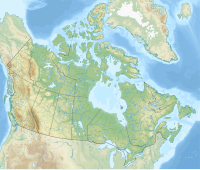Mount Robertson
| Mount Robertson | |
|---|---|
 Mount Robertson (centered) between Mount Sir Douglas dominating the right side and Mount French to the left side | |
| Highest point | |
| Elevation | 3,177 m (10,423 ft)[1][2][Notes 1] |
| Prominence | 281 m (922 ft)[1] |
| Coordinates | 50°43′35″N 115°19′16″W / 50.72639°N 115.32111°W[3] |
| Geography | |
| Location | Alberta British Columbia |
| Topo map | NTS 82J/11 |
| Climbing | |
| First ascent | 1928 J.W.A. Hickson and Edward Feuz Jr. |
Mount Robertson is a mountain in the Canadian Rockies, standing astride the British Columbia-Alberta boundary between Palliser Pass and North Kananaskis Pass. The British Columbia side of the pass is in Mount Assiniboine Provincial Park. The mountain is named for Sir William Robertson (1860–1933), 1st Baronet, Chief of the Imperial General Staff from 1916 to 1918 during the First World War.[3]
Mount Robertson rises to an elevation of 3,194 metres (10,479 ft).[2]
Geology
Mount Robertson is composed of sedimentary rock laid down during the Precambrian to Jurassic periods. Formed in shallow seas, this sedimentary rock was pushed east and over the top of younger rock during the Laramide orogeny.[4] The Haig Glacier, largest singular glacier in Kananaskis Country, lies to the south of the peak.
Climate
Based on the Köppen climate classification, Mount Robertson is located in a subarctic climate with cold, snowy winters, and mild summers.[5] Temperatures can drop below −20 °C with wind chill factors below −30 °C.
See also
- List of peaks on the British Columbia-Alberta border
- Mountains of Alberta
- Mountains of British Columbia
References
- ^ a b "Mount Robertson". Bivouac.com. Retrieved 2021-01-05.
- ^ a b "Mount Robertson". cdnrockiesdatabases.ca. Retrieved 2021-01-05.
- ^ a b "Mount Robertson". BC Geographical Names. Retrieved 2021-01-05.
- ^ Gadd, Ben (2008), Geology of the Rocky Mountains and Columbias
- ^ Peel, M. C.; Finlayson, B. L.; McMahon, T. A. (2007). "Updated world map of the Köppen−Geiger climate classification". Hydrol. Earth Syst. Sci. 11: 1633–1644. ISSN 1027-5606.
- Notes
- ^ Multiple sources give elevations of 3177 and 3194 metres.



